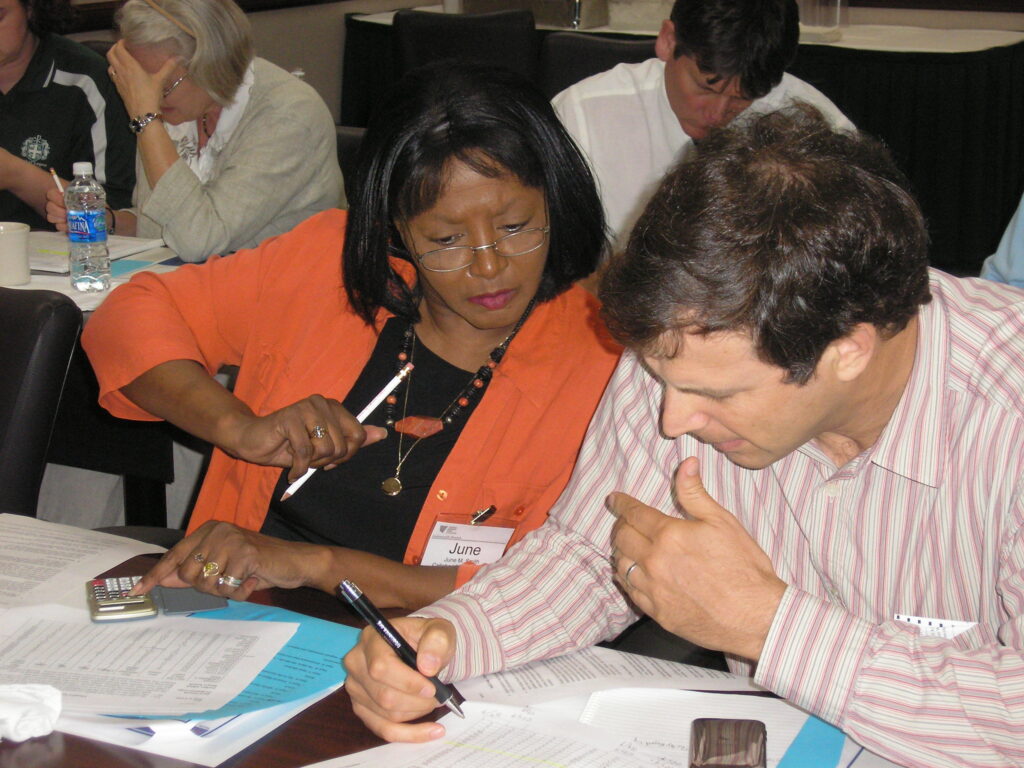The Foundation for Teaching Economics enlivens high-school classrooms by educating teachers and demonstrating economic principles through real-life examples. FTE estimates its programs have reached as many as 43 million students in its 20 years.
FTE hosts summer programs for rising high school seniors, but most of their programs target teachers. Offerings include Economic Forces in American History for history teachers; The Environment and the Economy for multidisciplinary teachers; seminars focused on basic economic principles, lesson plan development, and hands-on training; and various online courses.
One-day programs cover topics such as international trade, capitalism’s effect on the poor, and the economics of disasters.
“When you talk to a teacher, they’ll impact 100 students per semester,” said FTE Vice President Jim Klauder. “We are enabling [teachers] to be more effective.”
Nonpartisan but Pro-Market, Freedom
FTE programs are based on the principles of individual freedom, free markets, and political freedom. The lessons emphasize personal responsibility along with incentives, private property, and other basic economic principles. The foundation is politically nonpartisan.
Programs vary from half-day seminars to four-day conferences. High school teachers learn about economic principles and how to teach these effectively in their classrooms.
High school students who want to attend the organization’s weeklong Economics and Leadership seminar must complete a rigorous application process; teachers can sign up for the programs themselves. All program participants pay only for transportation to and from seminars.
“Many students write back to us,” Klauder said. “They impact their college campuses and choose to major in economics. Many go into that field and stay connected.”
‘Fantastic and Fascinating’
Many teachers have incorporated FTE materials and activities into their classrooms after attending the seminars. One such teacher is special education teacher Anthony Bombay.
Bombay teaches at Robinson Secondary School in Fairfax County, Virginia. He said FTE does an excellent job bringing in people with different backgrounds to talk about all sides of economics. This makes the programs both interesting and useful.
“I can’t emphasize enough the value of the experts they bring in,” he said.
During the Environment and the Economy program Bombay attended last February, FTE brought in a Ford Motor Co. representative to explain car pricing.
Bombay also attended a program last April in which FTE took participants on two field trips. First they toured a fish oil tablet factory, where they followed the oil from the ship all the way through marketing and selling the tablets. Another day, teachers toured an oyster farm.
“It was a beautiful visual,” Bombay said. “Fantastic and fascinating.”
‘Remarkable Impact on Participants’
In a recent independent evaluation of the FTE, Ina Mullis and Dana Kelly concluded, “FTE continues to provide students and teachers with an exceptional set of programs, each of which is having a remarkable impact on participants and, in turn, economics teaching and learning.”
Mullis, a professor at Lynch School of Education and codirector of the International Study Center at Boston College, and Kelly, a senior research analyst at the American Institutes for Research, evaluated the FTE’s 2010 programs by questioning 450 high school students and 1,475 high school economics teachers. They compared high school students’ pre-program test scores in economics to post-FTE program test scores. In addition, they questioned 230 teachers who participated in 2009 programs.
Their evaluation reported a 13 percentage point increase in pre- to post-test scores of students attending Economics for Leaders last summer.
“Across programs, participants provided similar and consistent feedback: FTE program content is stimulating, clear, and appropriately challenging,” the evaluation said. “FTE activities and simulations are clear, engaging and ready to use in the classroom. FTE instructors are responsive, knowledgeable, and engaging.”
‘A Class Act’
FTE was founded in 1976 as a 501(c)(3) nonprofit corporation, and in 1990 shifted its focus from K-12 solely to high school, primarily educating teachers.
In addition to other resources, Bombay employs ready-made lesson plans from FTE, taps into FTE’s multitude of online resources, and relays stories and experiences from the experts he has encountered at the seminars.
“I was so fortunate to find out about this organization,” Bombay said. “The foundation is a class act.”
Image courtesy the Foundation for Teaching Economics.




